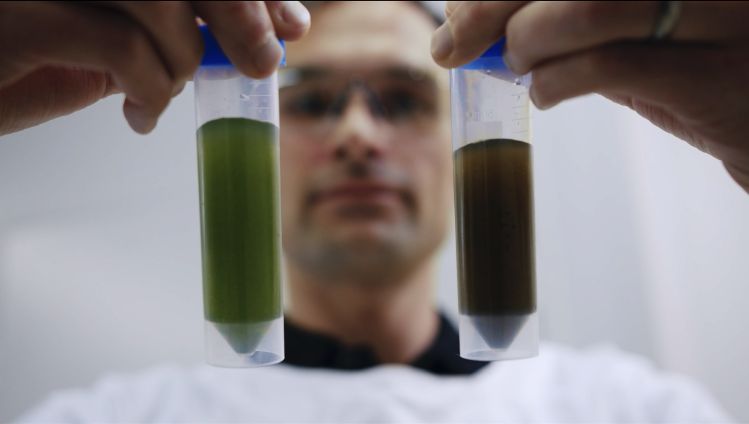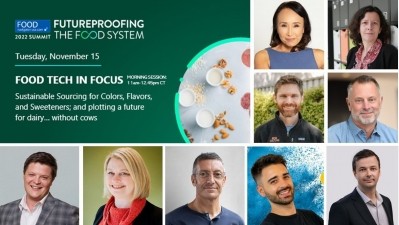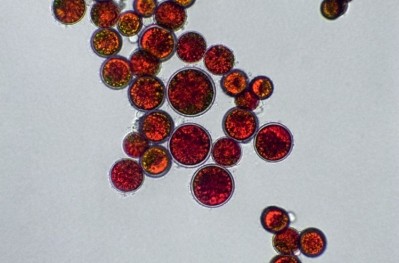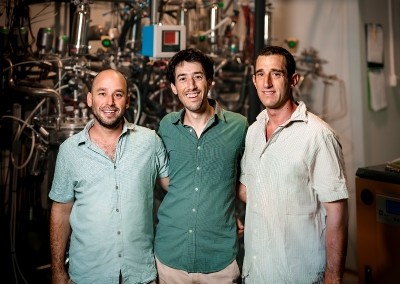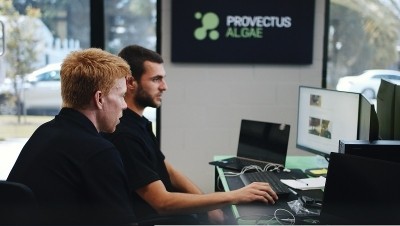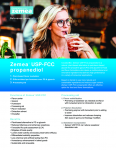‘If we can control the light, we can control the DNA…’ Provectus Algae unlocks algae’s potential as an industrial platform for high-value ingredients
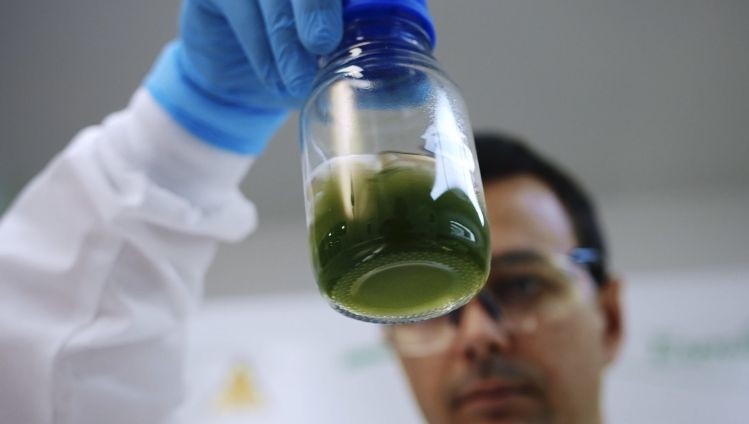
“We've got potentially about 200,000 algae species that we know of on planet Earth - we don't even think we've scratched the surface yet - and out of those, only about 20,000 have been characterized, and from these, only about 15 have been grown commercially at any scale,” Provectus Algae founder and CEO Nusqe Spanton told FoodNavigator-USA.
“And the reason is because algae is extremely particular about the light which it absorbs to grow [most algae species are photosynthetic, in that they require light – along with carbon dioxide and water - to produce organic compounds].
“When it grows really fast, it tends to block out its own light, and the specificity of the light that's required to grow all of these algae species is vastly different. Think about the environments in which algae grows… on the surface of the ocean, at 500 meters deep. And if you think about the way light is utilized in these environments, it's very different, so the vast majority of algae species we know of cannot handle natural sunlight to grow.
“But more importantly, 99% of all algae species are extremely fragile, and because of that, you can’t put many species in traditional production systems because you can destroy the algae cells, which has limited our ability to use algae [as a microbial host] for synthetic biology purposes, because it’s so hard to grow on an industrial scale without killing it.”
‘We’ve got a fundamentally different industrial process for growing algae’
“But these are two key problems we solved early on,” claimed Spanton, who is based in Queensland, Australia, but is targeting the US, Europe, and Asia. “We’ve got a fundamentally different industrial process for growing algae and this enables us to look at vastly different product lines and species to push through into industrial scale.
“So, we don't see ourselves as a competitor to anyone [growing things like spirulina or astaxanthin in outdoor ponds, or chlorella for protein, or Schizochytrium sp for DHA omega-3s]. We're a complementary platform, to deliver novel products in algae that's never been utilized commercially before.”
He added: “We’re seeing huge interest from corporates; there's a significant move within the industry to move towards more sustainable and environmentally friendly production systems and alleviate some of the pain points associated with specialty food and beverage ingredients.”
Beyond yeast and bacteria: ‘I realized that photosynthetic algae could be the third pillar in synthetic biology’
Provectus Algae has developed closed system automated bioreactors using photosynthetic algae as a platform for growing high-value compounds at “extreme densities” with a series of LED lights, said Spanton, a marine biotechlogist who founded the business in April 2018 after years working with large-scale aquaculture systems.
“Seeing the rapid technological developments in synthetic biology; what became clear to me was that existing microbial platforms using bacteria and yeast really limit our ability to produce more complex molecules found in plants and animals.”
Yeast and bacteria, he said, are simple organisms good at converting sugar into carbon dioxide and energy. “So with yeast, say, you’re basically starting with an empty chassis of a cell, so you have to genetically engineer the entire metabolic process inside that cell.
“The beauty of using algae is that the majority of that process may already be done… it already has the metabolic components to deliver those products already. Algae is what all plants and animals evolved from originally, and so it’s vastly different from other microbial platforms that are existing today.”
‘Sometimes 90% of the genetic work is already done for us naturally by the algae’
He added: “The advantage of using algae compared to those other [microbial expression] systems is that sometimes 90% of the genetic work is already done for us naturally by the algae, so utilizing these existing biological components to our advantage, we're able to speed up product development time, which offers a huge advantage for our customers.”
He added: “I realized that photosynthetic algae could be the third pillar in synthetic biology, used alongside existing platforms [yeast, bacteria] to produce more complex molecules. So we’re building an entire bio manufacturing platform that is turnkey for customers, providing product development all the way through to contract manufacturing.”
Precision photosynthesis: ‘We’re able to deliver any type of light in the visible spectrum but also in the infrared and UV spectrum’
So how does it work?
Provectus deploys a couple of approaches: the first uses algae species that naturally produce a given compound such as a pigment or fatty acid.
Here, deploying what it calls ‘precision photosynthesis,’ Provectus can optimize and improve the algae’s productivity by exposing it to light, which effectively alters its DNA and improves its productivity without using techniques that would be classified as genetic engineering from a regulatory perspective, said Spanton.
“If we can control the light, we can control the DNA, and we’re able to deliver any type of light in the visible spectrum but also in the infrared and UV spectrum, manipulate the algae and push it down a metabolic pathway to vastly increase the production of a target substance naturally inside the algae."
‘We have the capability to do naturally occurring products… and also biosynthetic products using our synthetic biology toolkit’
The second approach involves using “the entire synthetic biology toolkit, such as CRISPR [gene editing], insertion of genes, design and synthesis of DNA, and inserting those genes into the algae, and we can then use that to upregulate [the production of a given substance] or to produce products that aren't naturally occurring at all in the algae,” he added.
“We have the capability to do both naturally occurring products in novel algae species that have never been commercially grown before, and also biosynthetic products using our synthetic biology toolkit to design and engineer new algae strains for novel high performance products that don't exist today.”
‘We expect to scale up very rapidly over the next two years’
According to an international patent application published in April 2020, Provectus Algae has developed bioreactors for growing algae with a controller connected to sensors that monitor everything from dissolved gases (oxygen, carbon dioxide) to cell density, temperature, pH, salinity, nitrates, and cell health.
This data is then sent to a remote device such as a laptop or cellphone from which users can set the spectrum, intensity, and flickering frequency of the LED lights, and make adjustments to the inputs and growing conditions, which can be optimized via artificial intelligence.
Right now, the company has a 20,000 liter pilot facility for product development, but is building a 200,000 liter facility, said Spanton, who has raised around $3.5m to date and is currently raising additional funds. “We expect to scale up very rapidly over the next two years.”
‘Our product is our platform’
The business model is designed for speed and agility, said Spanton, who is working with large ingredients suppliers and CPG companies.
Unlike companies focused on driving an individual product to market, he said, “Our product is our platform; customers pay for product development through to contract manufacturing. Once we've produced a commercially viable product, we then take a small share of the revenue in a royalty agreement once that’s taken to market.
“Let’s say you're producing plant-based burgers, and maybe you can’t source enough beets from conventional farming to produce your [pink color]. So companies will come to us, we’ll identify an algae that can [produce the target color/ingredient] for their application.
“If you need something vegan friendly and non GMO, we can deliver a product to those specifications. We’ll look for a naturally occurring algae species that can deliver the particular coloring you want, perhaps within a novel algae species, and then we can control and upregulate the process to vastly increase the production of that pigment in the algae.”
Patent protection
Asked about IP, he said: “We’ve got patents on using a cloud-enabled platform to produce algae, and there's a lot of trade secrets, IP that go around that in not only the production systems, in the hardware and software that go behind it, but also in the detailed components of how to grow algae, so there's a lifetime of knowledge behind Provectus Algae as well.”
Focus on high-value ingredients such as pigments, antioxidants, sweet proteins, specialty additives, and binding agents
Right now the company is exploring scores of ingredients from peptides to antibiotics for markets from nutraceuticals to pharma with partners in the US, Europe and Asia, but on the food side, he said, there is strong potential in high-value ingredients such as pigments, antioxidants, sweet proteins, specialty additives, and binding agents.
As for bulk protein, he said, “At the moment the production metrics just aren't there, although we fully expect that over the next decade as our as our technology comes to market, products like bulk proteins for alternative proteins markets will become commercially viable.”
